For those traveling to Japan for the first time (or planning a trip and visiting Japan virtually) it can be a bit of a culture shock. When I arrived I realized to not make waves and stick out like a sore thumb I needed to learn some things pretty quickly about the culture. Here is a list of 30 things to know before going to Japan.
Things to know before going to Japan
Cash is King
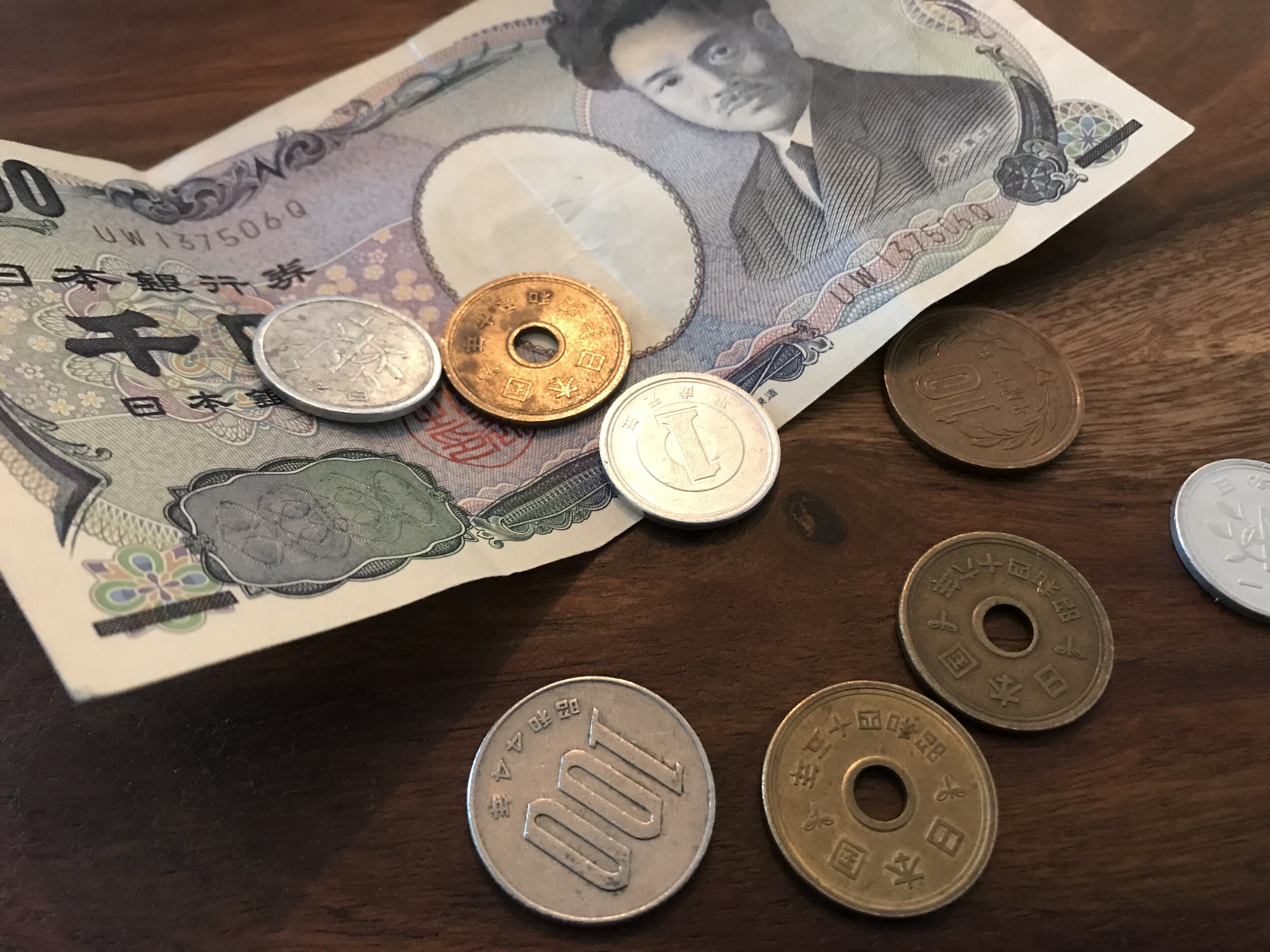
While Japan is known for being high tech, many places including restaurants and shops still do not take credit or debit cards for payment, so you’ll need to make sure you have cash on hand.
Most airports and hotels have money exchange, however, the exchange rate might not always be the best. When you really need cash in a pinch though it can be really helpful.
I’d recommend using local ATMs for taking out cash. While you’ll most likely be charged for using the ATM the change is usually better and more convenient as they can be found everywhere.
Read More: Things to do in Harajuku
Things to know before going to Japan: Purchase Pocket Wi-Fi
Using international calling on your phone, no matter the country you come from can be costly. Purchasing pocket Wifi before you leave home will help to cut your phone cost and you can bring it everywhere with you. Even in hotels the Wifi speed isn’t the best so having your own will be beneficial.
2 options I’ve used or know people who ave are Ninja Wifi and Fon. They both have great speeds, their prices are affordable, and their devices are small and compact for easy transport.
Don’t be shy at Onsens
A Japanese onsen is a hot spring and the facilities that provide a quiet place to soak in the naturally warm waters. When visiting an onsen everyone is required to soak naked.
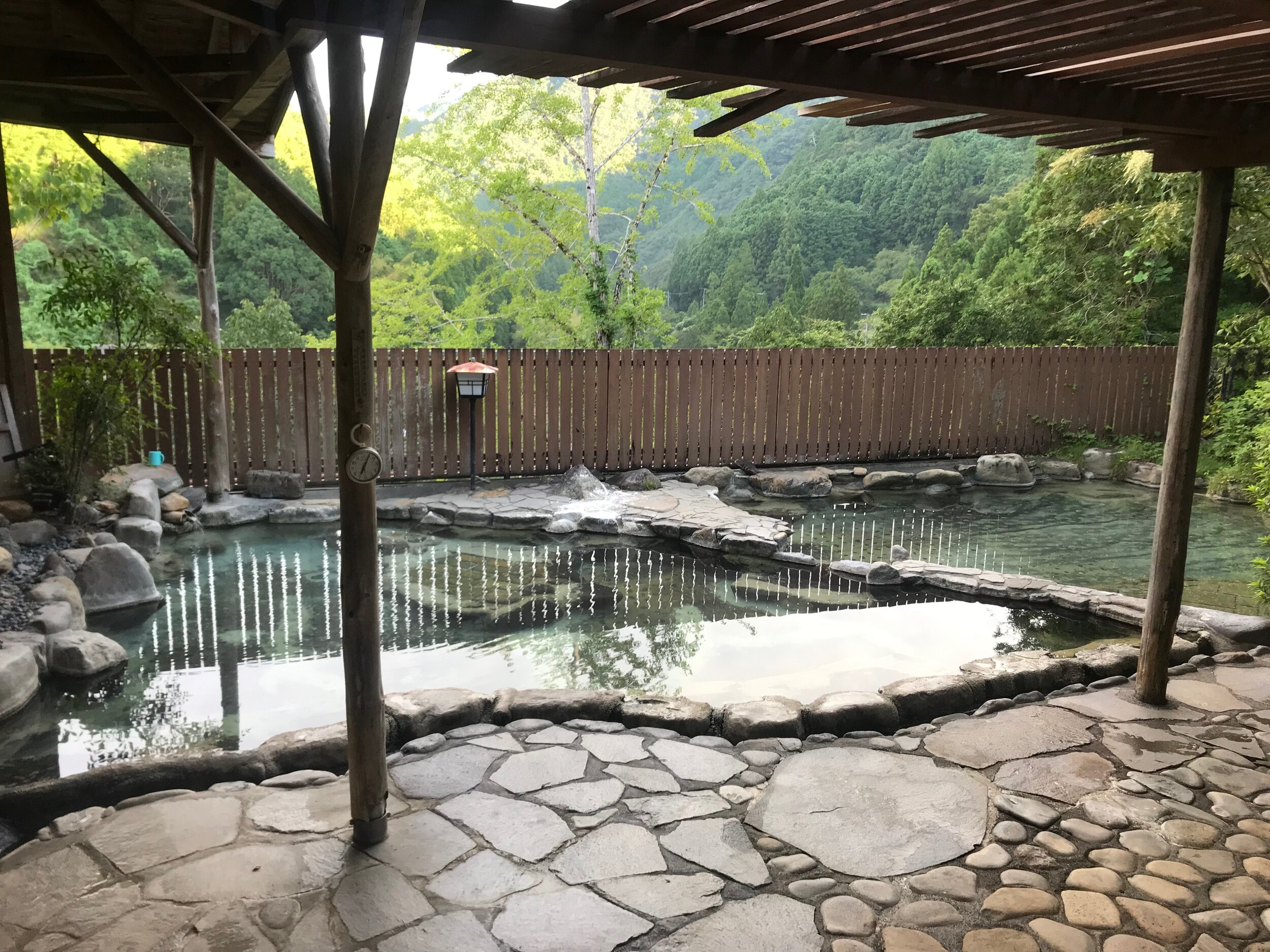
There is no need to be sky as it is a completely normal thing in Japan. Most onsens have a men’s area and a women’s area, so if getting naked in front of a person of the opposite sex makes you weary you don’t have to worry. Just make sure you follow the rules and just relax in all your amazing naked-ness!
Read More: Japanese Onsen Etiguette
There aren’t very many trash cans
For a country that is so clean, I was surprised that there were so few trash cans in public places. It took me a while to get used to this. So here are a couple of tips to help you out. First off, if you get food or snacks from a specific places eat it there, so they will depose of the trash for you. Second, keep a bag in your purse of backpack for spare trash you can’t dispose of on the go.
Pin it for Later!
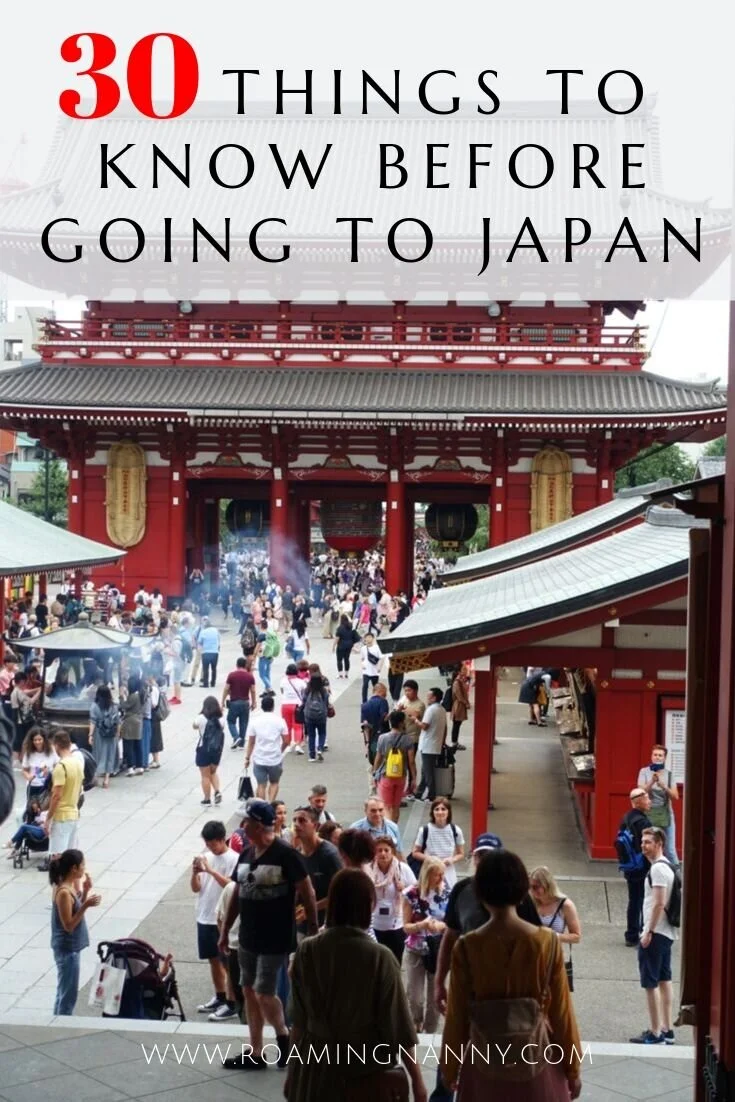
Things to know before going to Japan: Don’t Tip
If you grew up in a culture that tips it might seem weird not to tip, but just don’t do it. It is considered rude in Japan. I’ve seen plenty of discussion in the plethora of travel Facebook groups I’m in about tipping and how people, “Tip because they want to,” and I find it to be distasteful if it is culturally unacceptable. Just don’t tip. Period.
Department Store = Food Paradise

When I was told that in the basement of most Japanese department stores there is a food paradise I laughed. But I’ll tell you this isn’t your 1980s mall food court. Head inside some of the larger department stores like Isetan, Daimaru, and Tokyu and you really will find a food lovers paradise in their basements. Any Japanese food you could ever want can be found in these basements. I ate chicken, eel, liver of some kind, and chocolate cake one day from the same place. It was perfection, though I could have skipped the eel.
Read More: What to do in Tokyo
Japanese Toilets are an experience
The first time I sat down on a Japanese toilet it was heated and I didn’t like it. By the time I left Japan and arrived at my next destination I was sad that the toilet seats weren’t heated.
As much as I love Japanese toilets they can be a bit intimidating. There are so many darn buttons written in Japanese that you have no idea what they say or do. One morning, I used the toilet, pressed the heat button, and it turned out to the be bidet button. That was a big surprise.
I know I’m really not selling the toilets, but I’m seriously thinking about getting this toilet seat add on. Don’t tell my boyfriend though, he’ll probably hate it.
Things to know before going to Japan: The Metro doesn’t run 24 hours
While in many big cities around the world there is public transportation 24 hours a day in some fashion. However in Japan the metro does not run 24 hours a day. While Japan does get crazy after dark you’ll have to use taxis and Uber to get around after the trains stop running.
Most people end up in Tokyo at some point during their time in Japan, so here are the timetables to the Tokyo Metro and the JR, the two public transportation systems in Tokyo.
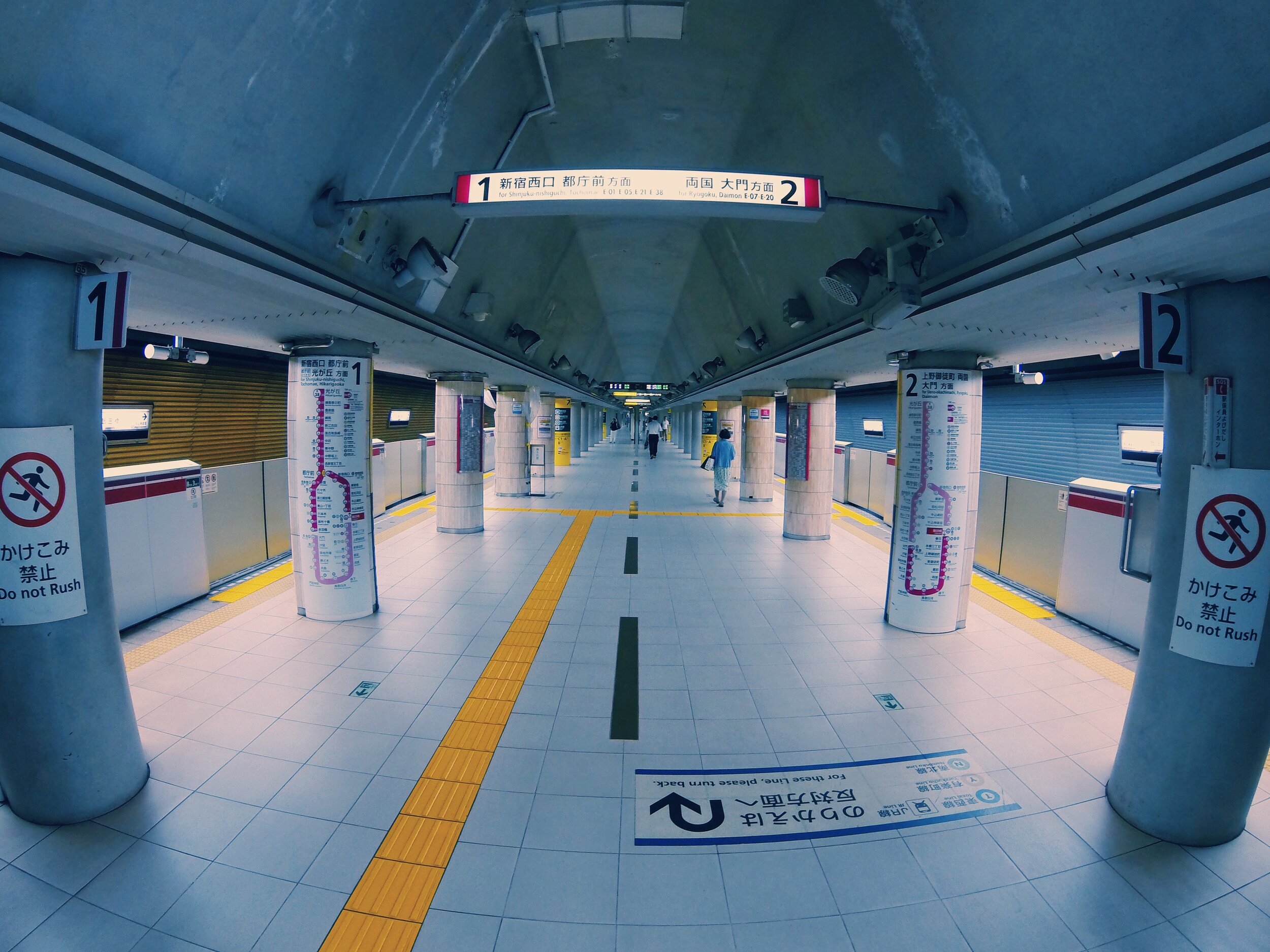
Skip the Animal Cafes
If there is a cute and small animal you’ll probably find an animal cafe with that adore looking creature inside. Cat’s are clearly living their best lives inside these places, but I also saw cafes with owls and otters inside. While the otter is one of my favorite critters in the animal kingdom, and my animal alter-ego, they don’t belong in a cafe to entertain people.
There are plenty of super cute and fun cafes throughout Japan, I encourage you to choose one of those over an animal cafe. Not to mention many of these animals shed. I don’t want to think about how much animal hair is just lingering in these places. Yuck!
Read More: Ultimate Guide to Tokyo DisneySea
Stay Silent on Public Transportation
Shhh!! No seriously, there is little to no talking on any form of Japanese public transportation.
The first day I was in Tokyo I got on the metro with 2 of my friends. One of those friends is louder than I am, and that’s pretty loud. Everyone on the metro was looking in our direction before we realized that we were being too loud.
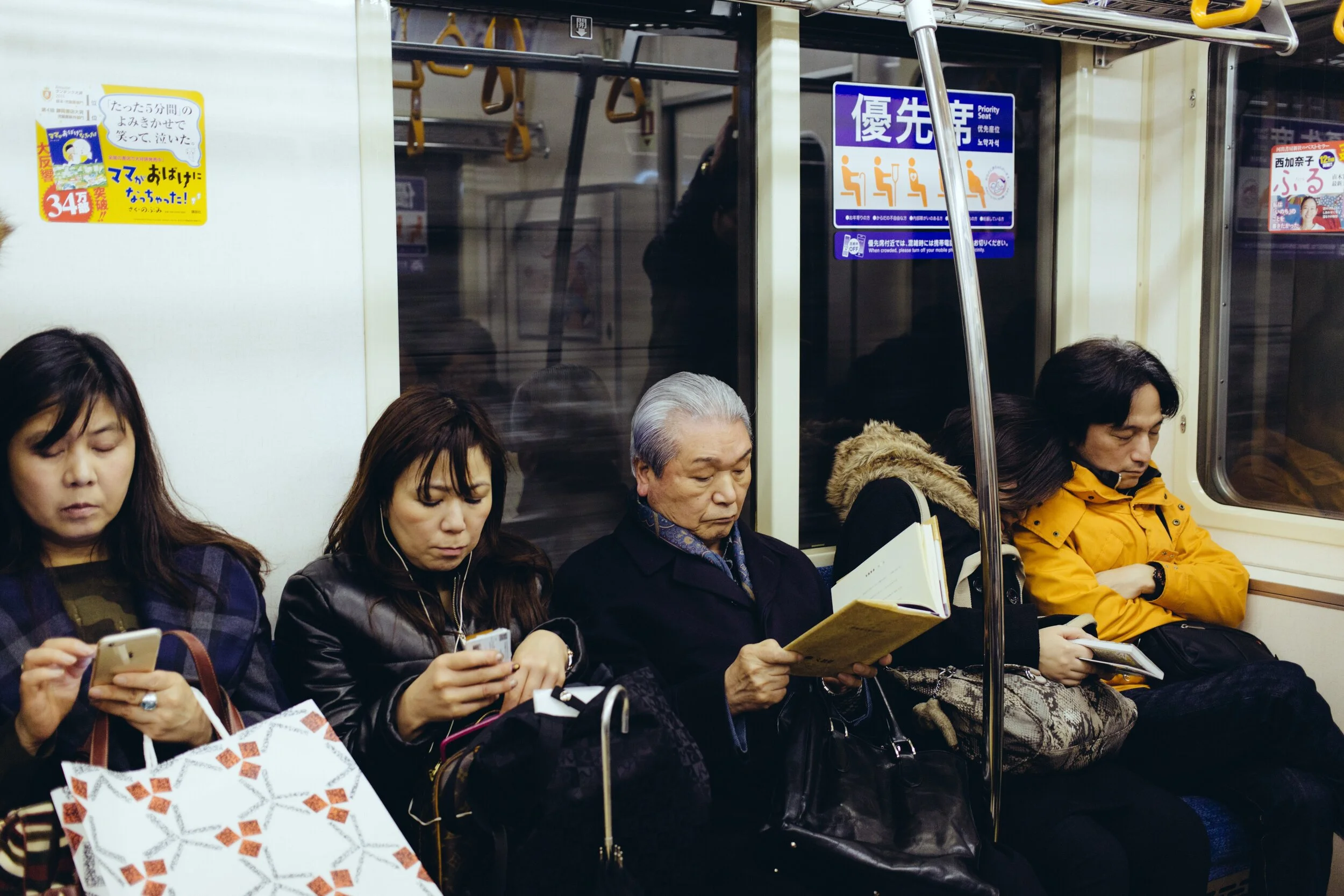
People on public transportation in Japan are usually on their phones, listening to music, reading, or completely passed out.
But keep in mind personal space isn’t a thing in the metro. Bumping into people and being WAY too close to them is totally common. Unfortunately, some men feel that it’s OK to grab women in busy public transport. During rush hour many lines, in Tokyo at least, have women only cars. You can find markings on the platform identifying the cars.
Things to know before going to Japan: Bowing
Japanese people greet each other by bowing. Shaking hands when greeting people is uncommon. A bow can be as simple as a head nob, which is considered casual. In contrast, a deeper bow with a bend at the waist shows respect and is vert formal. When bowing, don’t put your hands in prayer as it is not part of the bowing custom in Japan.
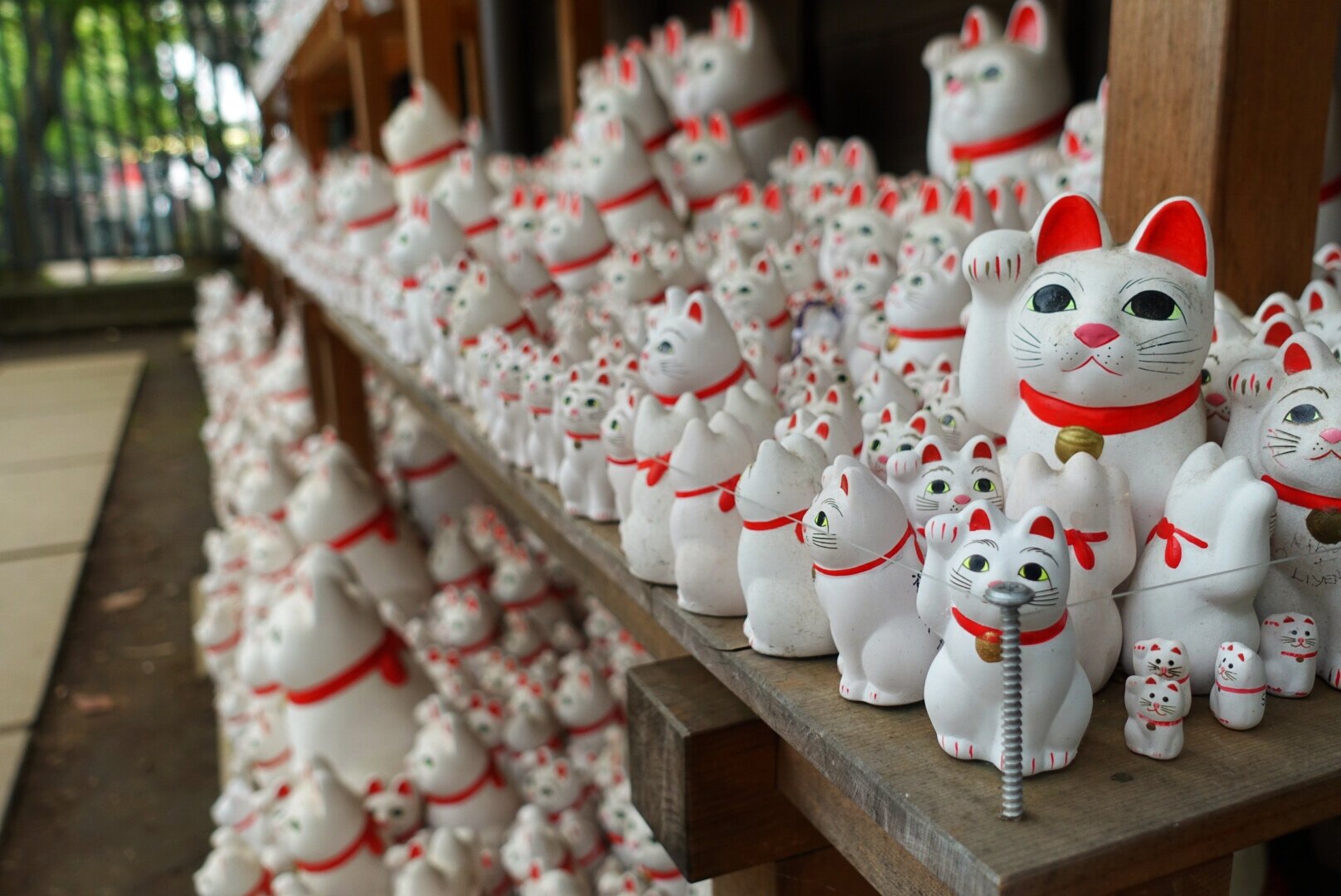
Like everything in Japan there is a right and wrong way to do things, but for visitors showing an effort to understand the custom is always appreciated. If you will be doing business or anything very formal during your trip to Japan make sure to ask about bowing customs beforehand as to not offend anyone.
Read More: Sumo Wrestling in Tokyo
Walk (and Drive) on the Left
Cars in Japan drive on the left side of the road, so when walking down the street – or anywhere really – walk to the left. It took me a little while to get used to this, but being aware of your surroundings will help you adjust quickly. Japan is an orderly place and if you’re in a busy area walking in the opposite direction will make things difficult for you and everyone else.
This is especially important to remember in the metro. As in big cities like Washington DC and London, you need to stand to one side on the escalator, so people can walk on the opposite side. In Japan you rand on the left side. People will stop behind you most of the time, but wont say anything as they do not want to be rude. Don’t put someone in this position, just go with cultural norms and stand to the left.
What’s with the Surgical Masks?
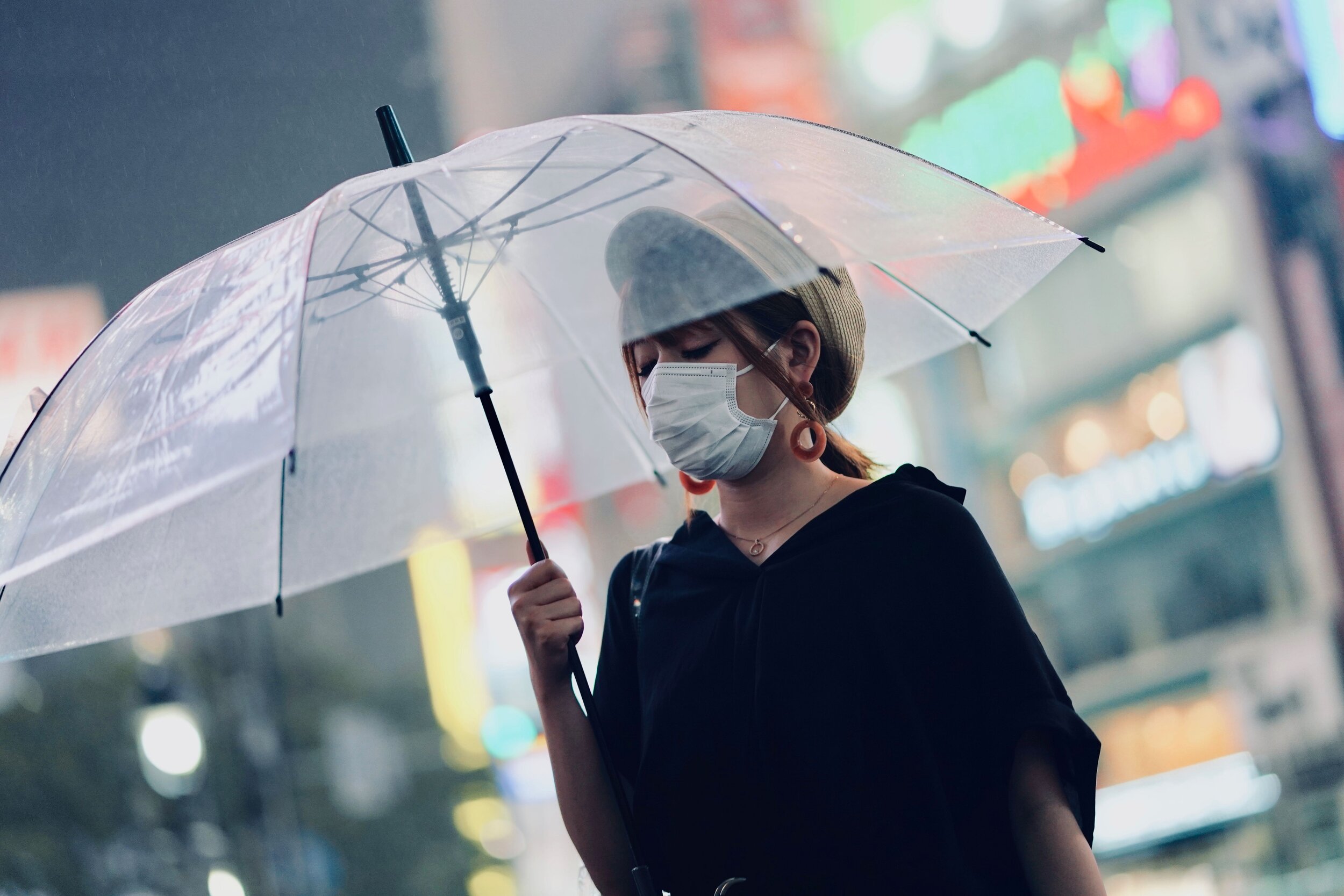
No matter where you go in Japan you’ll see someone wearing a surgical mask at one point or another. The surgical masks are worn by people who aren’t feeling well so they don’t spread their germs to others nearby. I think it’s a great idea that other cultures should adopt to stop the spread of disease.
Be respectful and take of your shoes
In some places, you visit in Japan you’ll be asked to take off your shoes. This can range from restaurants to hotels and everywhere in between. Traditionally, people in Japan do a lot of sitting on the floor and to keep the floor clear of dirt taking off shoes is customary.
Most places, in exchange for your shoes, will give you a pair of slippers to put on while you’re visiting. These shoes are to be worn all over, except in the bathroom. In the bathroom, there will be another pair of slippers for you to put on that are special to be worn on the bathroom floor.
It can get a little complicated with all the shoes but don’t be afraid to ask questions if you don’t know what you’re doing.
You can get away with English but learn a few phrases
Many people in Japan speak in English, but not everyone. However, there were times when I ended up miming what I wanted or was looking for. Using Google Translate also helps, but go ahead in and learn a few Japanese phrases. No matter the country you visit locals always appreciate it when travelers try to learn some of their languages. Japan is no different. Check out the video below to help you learn a few phrases that’ll help you during your visit.
Read More: Things to do in Yokohama, Japan
Things to know before going to Japan: Smoke in Designated Areas only
Smoking is acceptable only in designated areas in big cities. You’ll see areas marked with a cigarette symbol that are usually boxed in the glass or surrounded by bushes and trees.
No matter where you smoke do not drop your cigarette butts on the ground. You’ll need to dispose of them properly or take them with you. Japan is a very clean place and culturally they don’t drop trash of any kind on the ground.
Stay at Ryokans
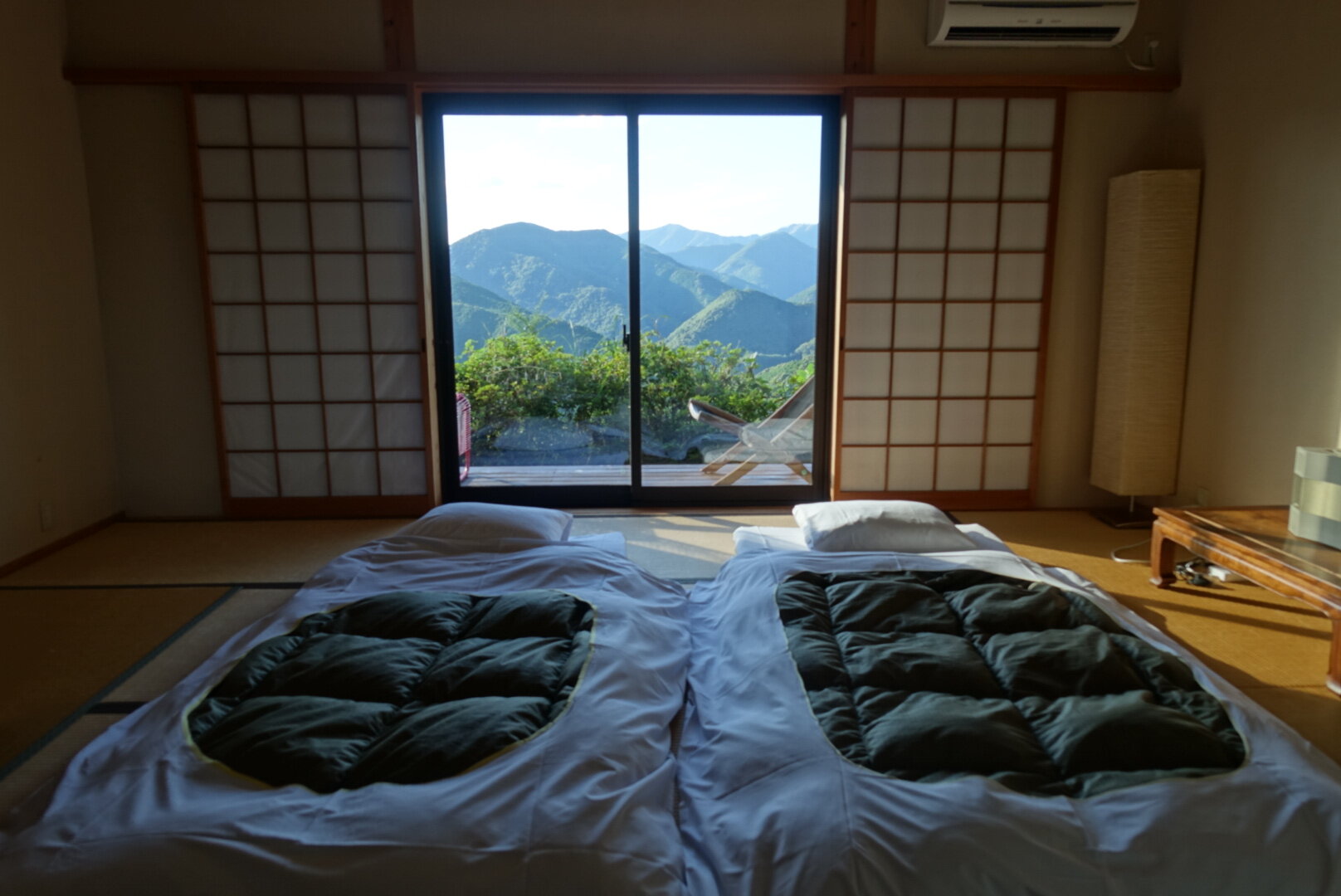
A ryokan is a traditional Japanese inn. At a ryokan your bed will be a mat on the floor, the rooms will be lined with tatami mats, and you’ll be required to take your shoes off upon entering. Most ryokans will have some kind of communal bath if not an onsen. When staying at a ryokan a yukata, traditional robe, similar to a kimono but made of cotton and worn when relaxing, will be provided. Guests wear their yukatas around the ryokan, even in communal space and to dinner.
Ryokans range in size, but most are small and only offer space for 10-20 guests. I stayed in several ryokans during my time in Japan and thoroughly enjoyed rocking a yukata everywhere I went. I love that yukata life.
Tattoos are Taboo
In Japan tattoos are still taboo as at one time they were associated with organized crime gangs, the Yakuza. While this is slowly changing, especially in the younger generations, older Japanese people might take issue with people that have tattoos. Although I didn’t have any issue – I have several large tattoos – there may be some places, especially in rural areas that visitors may receive stares or may be denied entry to places, especially in some onsens.
Things to know before going to Japan: Purchase an IC Card
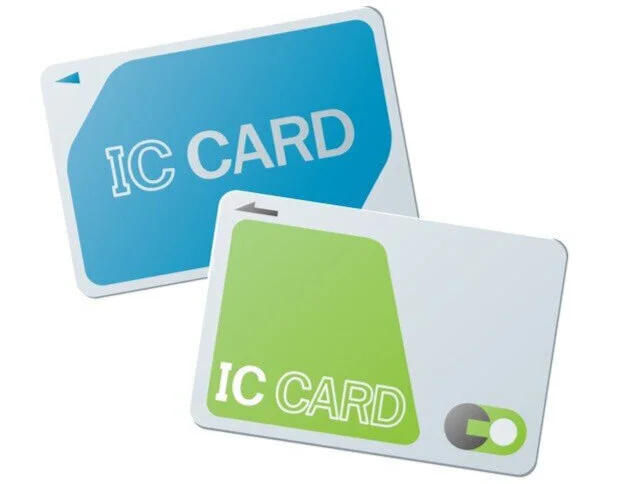
An IC card is a rechargeable card you can use to pay for metro systems all across Japan. When you first purchase the card you need to pay ¥2000, ¥500 of which is a deposit on the card itself. This deposit can be exchanged for your IC card when you leave Japan by speaking with a station attendant.
The IC card makes using public transportation in Japan so much easier as you use 1 card no matter the city or system you use. More money can be added to the card by using a ticket kiosk at train station throughout Japan. Additionally, the IC card can be used at convenience stores, lockers, and vending machines all over the country. Look for the IC card logo and the tap machine.
For everything else you need to know about IC Cards click here.
For those with Allergies and Food Restrictions
Traveling with food allergies can be stressful. I can’t even imagine what it would be like for anyone with a food allergy especially if it is a life-threatening one. To assist anyone that has a food allergy or other restriction (vegan or vegetarian) check out this website, Just Hungry. A Just Hungry you can get a printable card that you can share with those preparing your food while in Japan. This is not something you want to get lost in translation. Stay safe my friends!
So many Temples and Shrines, so little time
There are thousands upon thousands of shrines and temples all over Japan. During my visit I visited so many that they all started blending together.
My best advice is to do your research and go to the ones that really speak to you. They’re all gorgeous and have special meaning for different people. The larger temple complexes are great for wandering through and fully exploring every nook and cranny.
For those who want to delve deeper into the religious significance of each temple and shrine, you should hire a guide. There is little to no signage at many of the shrines and temples and a guide can help you find a broader understanding of the meaning behind each location.
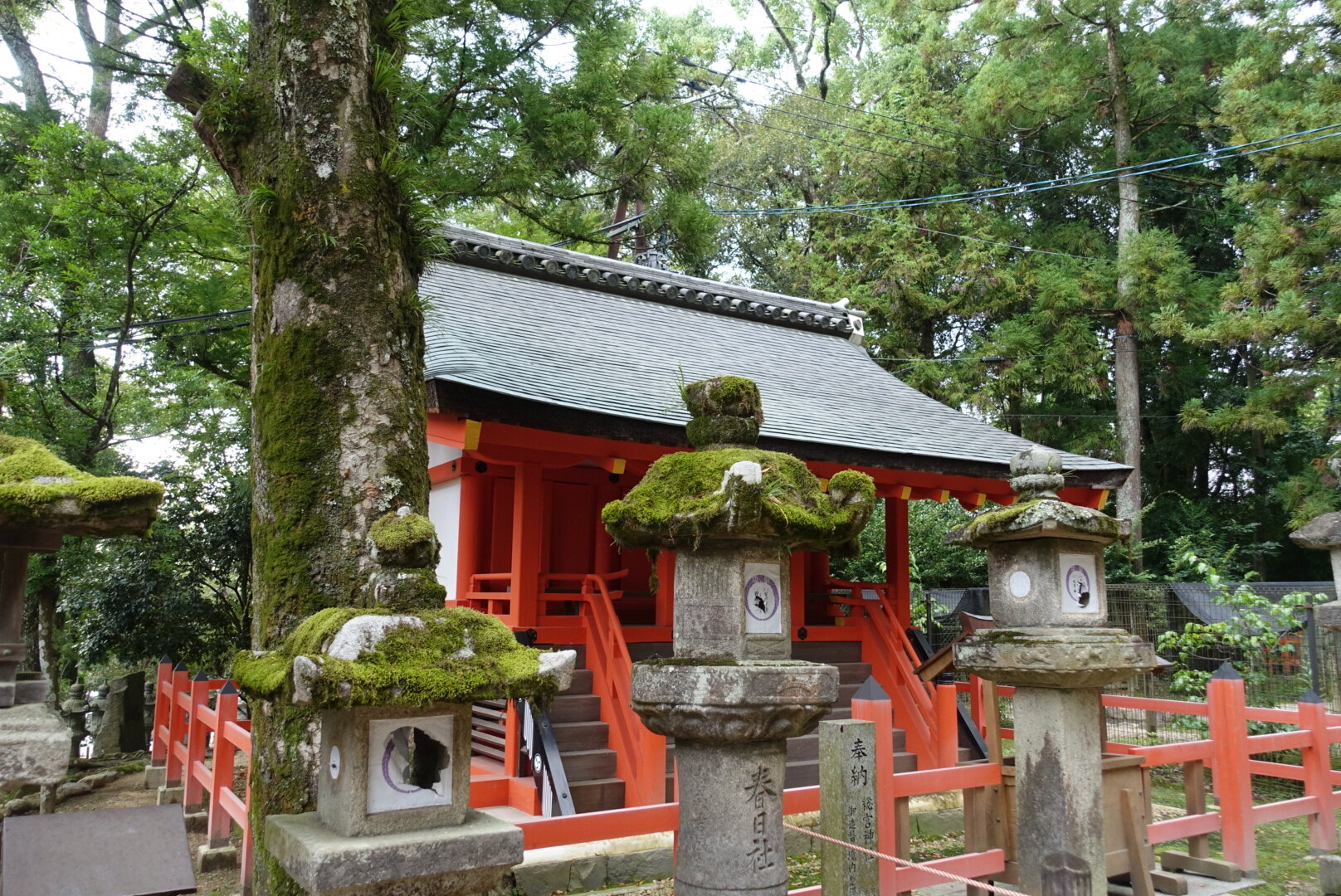
Things to know before going to Japan: Use a Luggage forwarding service
Japan is all about train travel. However, on many trains there is little to no space for your luggage. And I know this from experience! Cramming into my seat with my legs on top of my suitcase is not comfortable for a 3 hours train ride.
Takkyubin is an essenial luggage forwarding service from the Yamato company. They can ship your luggage all over so you can travel hands free. This gives more time to explore and less time dealing with hauling luggage around busy train stations. Find out more about Japan’s top luggage service here.
Eat all the Food
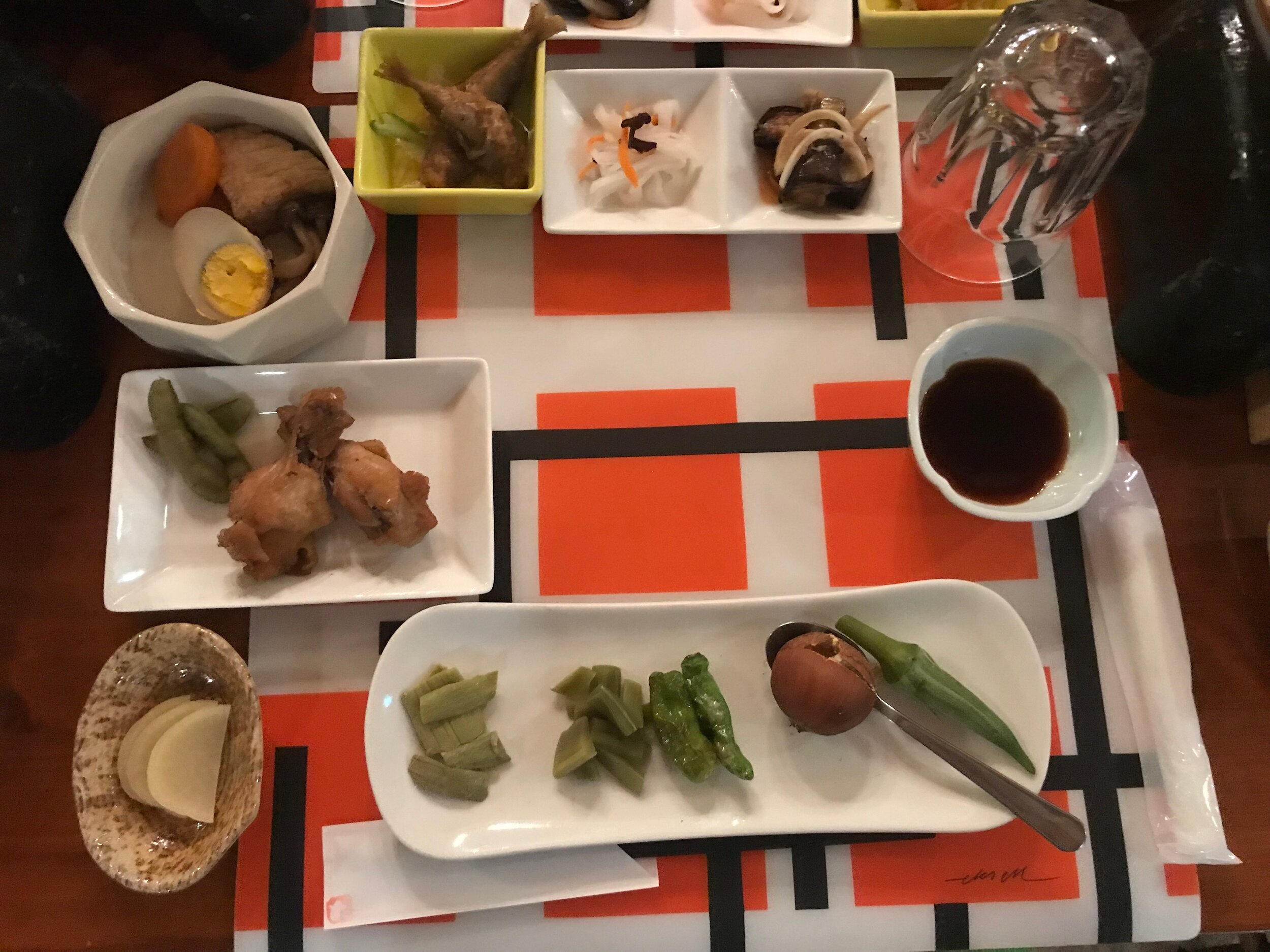
One of the best travel tips I can give about Japan is eat all the food. I have to admit that I’m not an adventurous eater, so doing this while I was in Japan was completely out of my comfort zone. To be honest, I don’t even know what most of the things I ate were until after I ate them, just so I would eat them.
I found out that I enjoy tuna sashimi, I don’t like roasted fish on a stick, and I absolutely adore
Additionally, turning down food at a traditional Japanese meal is considered rude, so just
Things to know before going to Japan: Get Underground
In Tokyo and Osaka there are massive underground malls that you’ll get lost in. They frequently connect subway stations to each other, and I wont lie I got lost in a few of them while in Tokyo. Climbing up a set of stairs and being on the opposite side of a busy street than you want to be sucks. However, the shops and food you can get in these subterranean worlds are pretty amazing.
Learn to use Chopsticks
I’ve talked a lot about food in this post, but not about what you eat that food with. In Japan chopsticks are the tool most commonly used for eating. I’ll be the first to admit that I’m not amazing at using chopsticks. I did however get better the longer I was in Japan because it’s all I used. I recommend that you get yourself a set of chopsticks before your trip so you can practice. To help you learn how to use chopsticks check out this video from Emmy Made in Japan where she’ll teach you everything you need to know about using chopsticks including some etiquette.
Cities are crowded
There are lots of people in the cities of Japan. More than I thought there would be to be honest. In rest years, more and more people are moving from small villages in Japan to cities. There are more jobs and better opportunities, resulting in a bit of overpopulation. There is nothing you can do about crowded cities. I would, however, recommend avoiding the metro and public buses during rush hour if you get overwhelmed by crowded spaces.
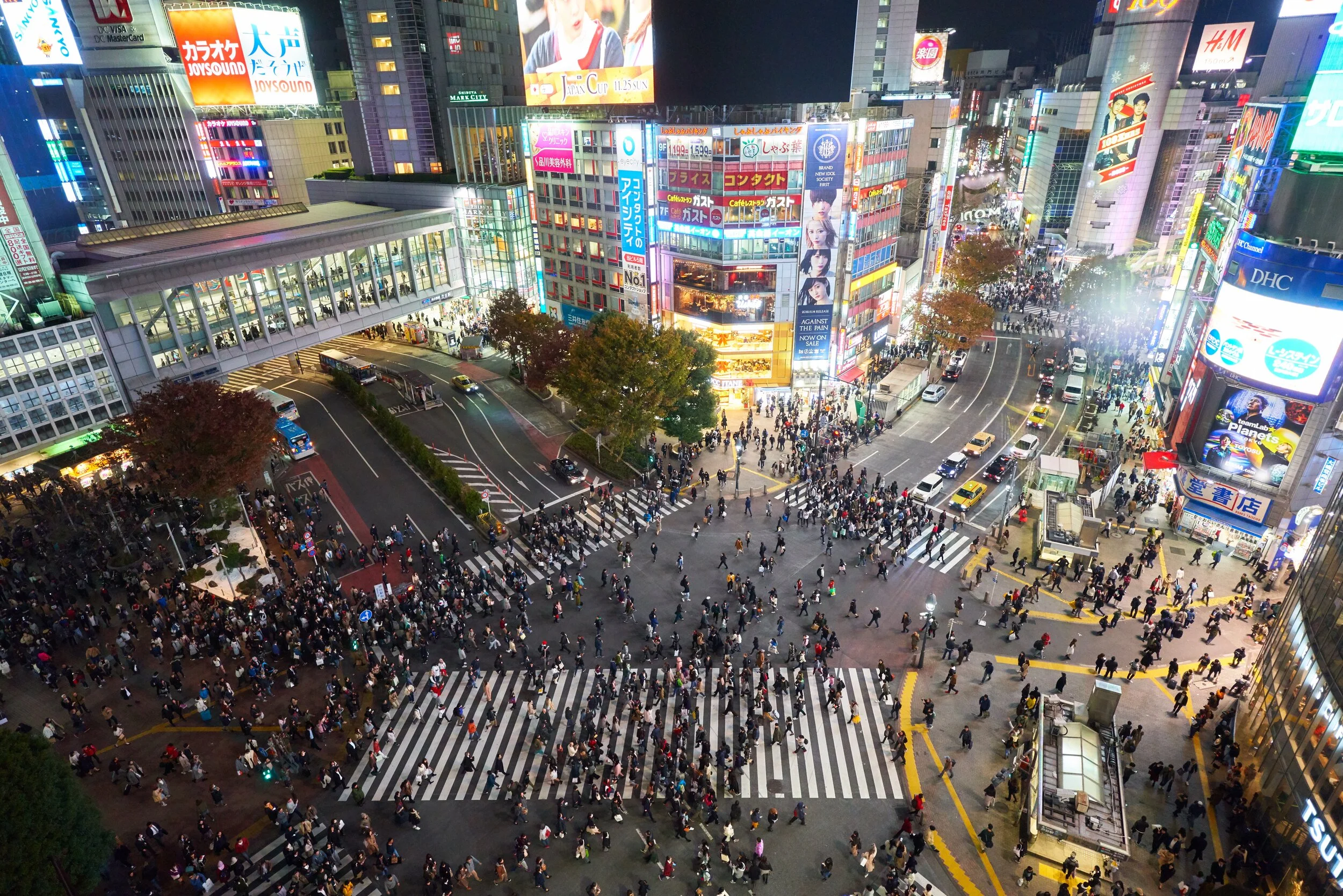
Things to know before going to Japan: Go to 7-11
Speaking of food, let’s talk 7-11. Yes, that corner store that sells Slurpies in the United States is so much more in Japan. 2 of my good friends have a foreign exchange student from China who I met recently. We were talking about my trip to Japan and he asked excitedly as his eye lit up, “Did you go to 7-11?” And I answered, “Obviously!” That’s how good 7-11 is in Japan.
Just like in the U.S. there are plenty of prepackaged foods, but you can purchase bento boxes, grilled chicken (my personal favorite), egg salad sandwiches, and so much more. Just go inside and see for yourself. You could each lunch there everyday for a couple of weeks and have something different.
Japanese Gardens are the Best Gardens
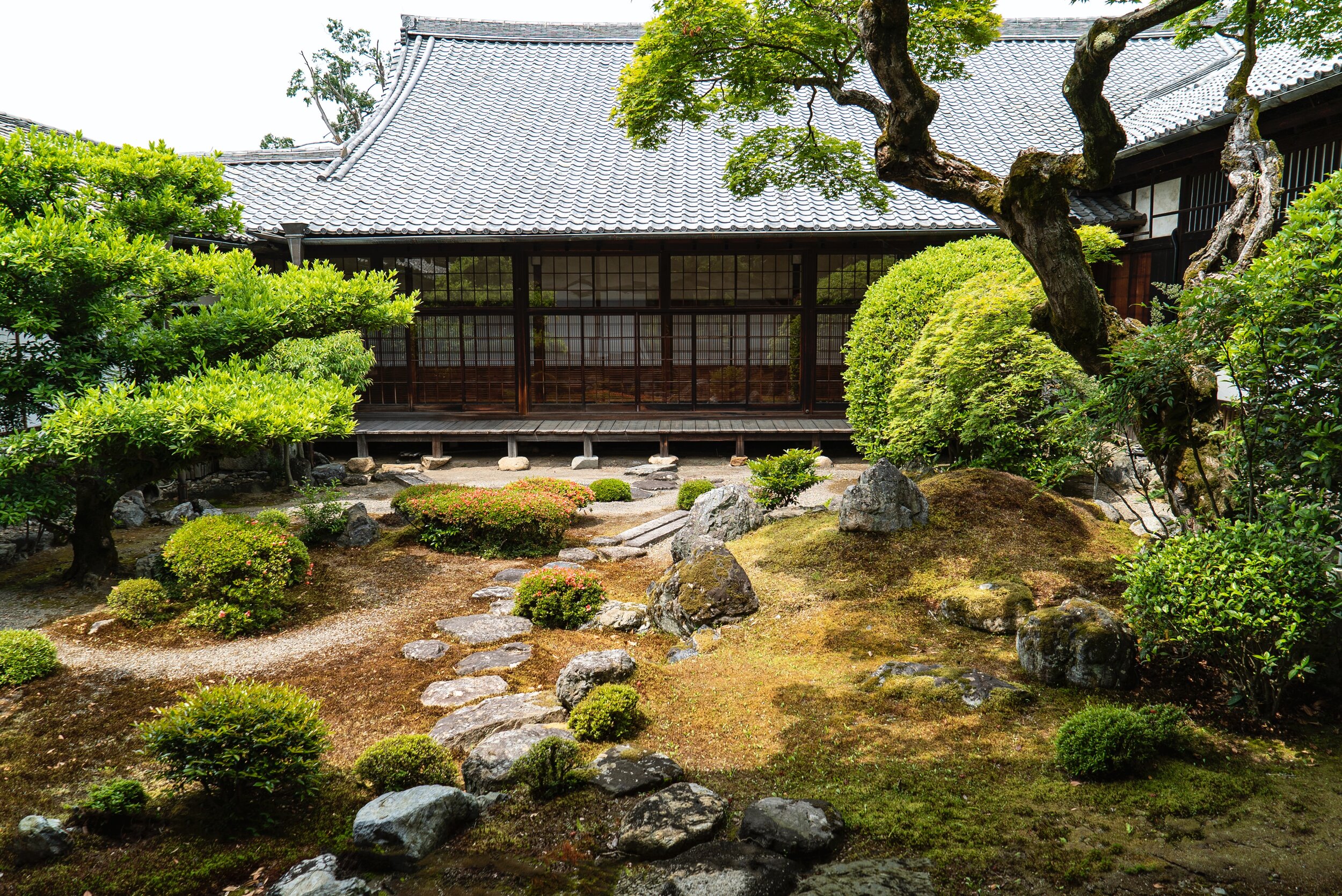
I’m a lover of gardens. When I travel I always try and check out botanical gardens, flower gardens, really any kind of garden possible. No other gardens, anywhere in the world, hold a candle to the ones I saw while I was in Japan.
Japanese gardens, like everything else in the country, have such planning and organized purpose. Everything places in the garden is planned to perfection. Each rock positioned in just the right spot. A tree trimmed to evoke the tranquility of the space. The green space and flowers are in perfect balance. It is nature at it’s more perfect.
That might not make any sense, so just go check one out and see for yourself.
Things to know before going to Japan: Get in the Queue
The Japanese love to queue. I thought this was just a thing the Brits did before arriving, but the Japanese definitely have the market corned on this. No matter where I was I saw orderly, organized lines everywhere if there was a wait.
On one of my days in Tokyo I took the train over to Tokyo Disney. I arrived 2 hours before rope drop and there were hundreds, if not thousands of people already lined up to enter the park. Inside the park was no different. DisneySea had a Pirates of the Caribbean themed show for the summer. Over 2 hours before the show was scheduled to start there were people sitting on the ground (on fold-able mats they brought with them) around the area where the show would take places.
So, no matter where you are in Japan, if you see a line, don’t be a rude tourist and try to jump to the front. Get in line with everyone else and wait.
Getting turned away at Restaurants
Some Restaurants and bars are for locals only. The waiters, waitresses, owners, etc. will turn people who are clearly visitors away. As someone who lives in an area of the U.S. (Vermont) where there are a ton of tourists I think I’d like a place that only locals could go and not have to deal with tourists. On the other hand getting turned away can be a little off-putting. Just be aware that this can happen, and brush it off. You can’t blame people for wanting their own space.
What other things to know before going to Japan would you add to this list? Need any more tips? Ask me anything in the comments.
Love it? Pin it!
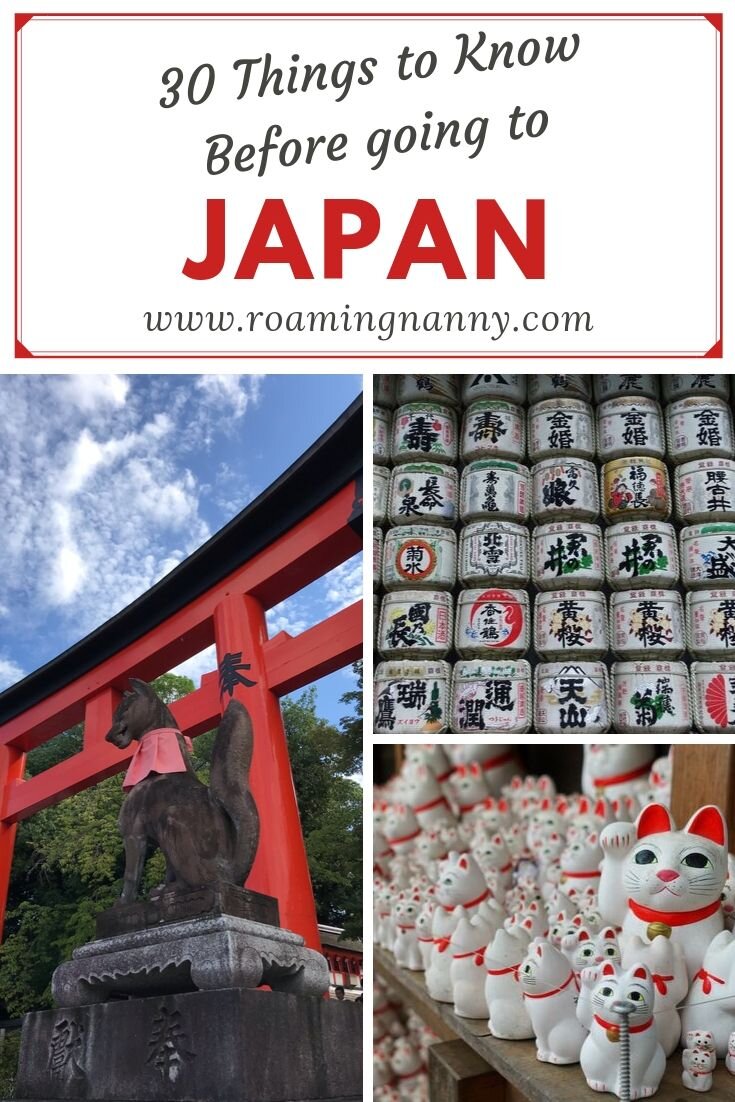
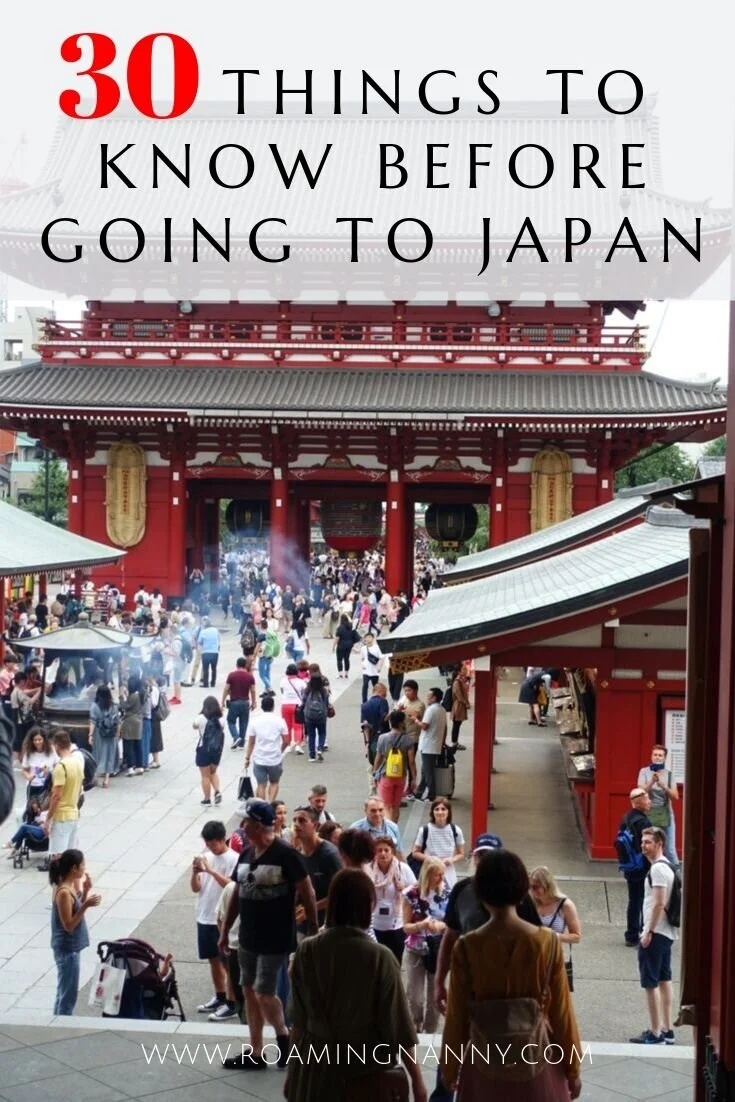


Wow, this is so useful. Thanks for sharing. Japan has been on my bucket list for so long.
You HAVE to go! It’s such an amazing place. I’m supposed to be there right now, but ya know, COVID-19.
Interesting. I lived in Japan for a few years, but I was never turned away at a restaurant. Did they say it was for locals only, or just Japanese people? Or was it just that they didn’t speak English?
I totally agree about the pocket wifi and the animal cafes!
They said it was for locals only. And I will NEVER go inside an animal cafe it’s cruel and kind of gross.